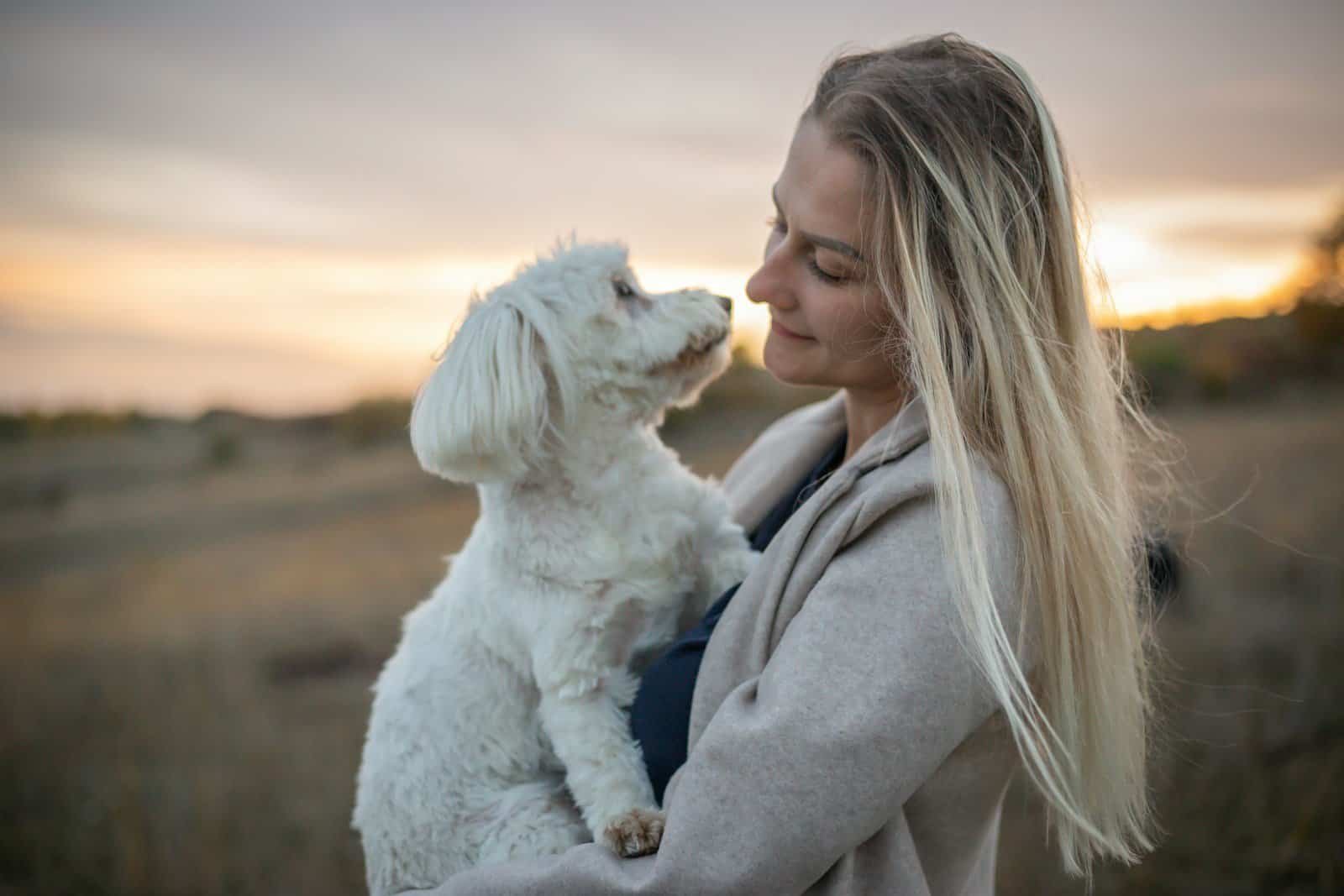
Understanding Rescue Poodles
Rescue poodles come from all sorts of backgrounds. Some had happy homes, while others faced neglect or abandonment.
Knowing a rescue poodle’s history can help you care for them better. It’s not always easy, but it’s worth it.
What Is a Rescue Poodle?
A rescue poodle is a dog that’s been surrendered, abandoned, found as a stray, or removed from a harmful situation. Rescue groups step in to give these dogs health checks, grooming, and socialization before they’re ready for new families.
Many rescue poodles stay in foster homes for a while. Foster families help them get used to daily routines and build trust with people.
Fosters learn a lot about each dog’s quirks and habits. That insight makes it easier to match poodles with the right forever home.
Poodles in rescue can be puppies, adults, or seniors. Some need extra patience as they settle in.
Common Reasons for Rescue
People sometimes surrender poodles when life changes—moving, illness, or financial struggles can all play a part.
Allergies, pet restrictions in housing, or high medical costs push some owners to give up their dogs. It’s tough, but it happens.
Neglect and abuse are real problems, too. Some poodles come from hoarding or puppy mill situations and need a lot of TLC.
Rescue groups work hard to help these poodles heal and learn to trust again. They give them a safe place to land.
Sometimes, poodles end up in rescue because of personality clashes with other pets or unrealistic expectations about grooming needs. A little research up front can help avoid these situations.
Poodle Breeds in Rescues
Poodles come in three main sizes: Standard, Miniature, and Toy. You’ll find all three in rescues, but their numbers vary.
Standard poodles are less common. Miniature and toy poodles show up more often.
Here’s a quick look at their sizes:
| Size | Height at Shoulder | Typical Weight |
|---|---|---|
| Standard | Over 15 inches | 40-70 lbs |
| Miniature | 10-15 inches | 10-15 lbs |
| Toy | Under 10 inches | 4-6 lbs |
Each size has its own personality. Standards are usually calm and athletic, while minis and toys can be more energetic or nervous.
There’s usually a good fit for most households, whether you live alone or have a big family. If you want more details, check out Poodle Rescue Information.
Poodle Mixes and Doodles
Poodle mixes—doodles—have exploded in popularity over the last couple of decades. Think labradoodles, goldendoodles, and all sorts of creative combos.
People often choose doodles for their coats or friendly personalities. But sometimes owners aren’t ready for the grooming or energy these dogs need, and that’s how they end up in rescue.
Poodle mixes come in all shapes, sizes, and coat types. It depends on the mix.
Not every doodle is hypoallergenic, even if that’s the hope. Rescue groups usually let you know what to expect with each dog.
More and more organizations now help both purebred poodles and poodle mixes in need of rescue. They’ll guide you through the process and help you find a good match.
Benefits of Adopting Rescue Poodles
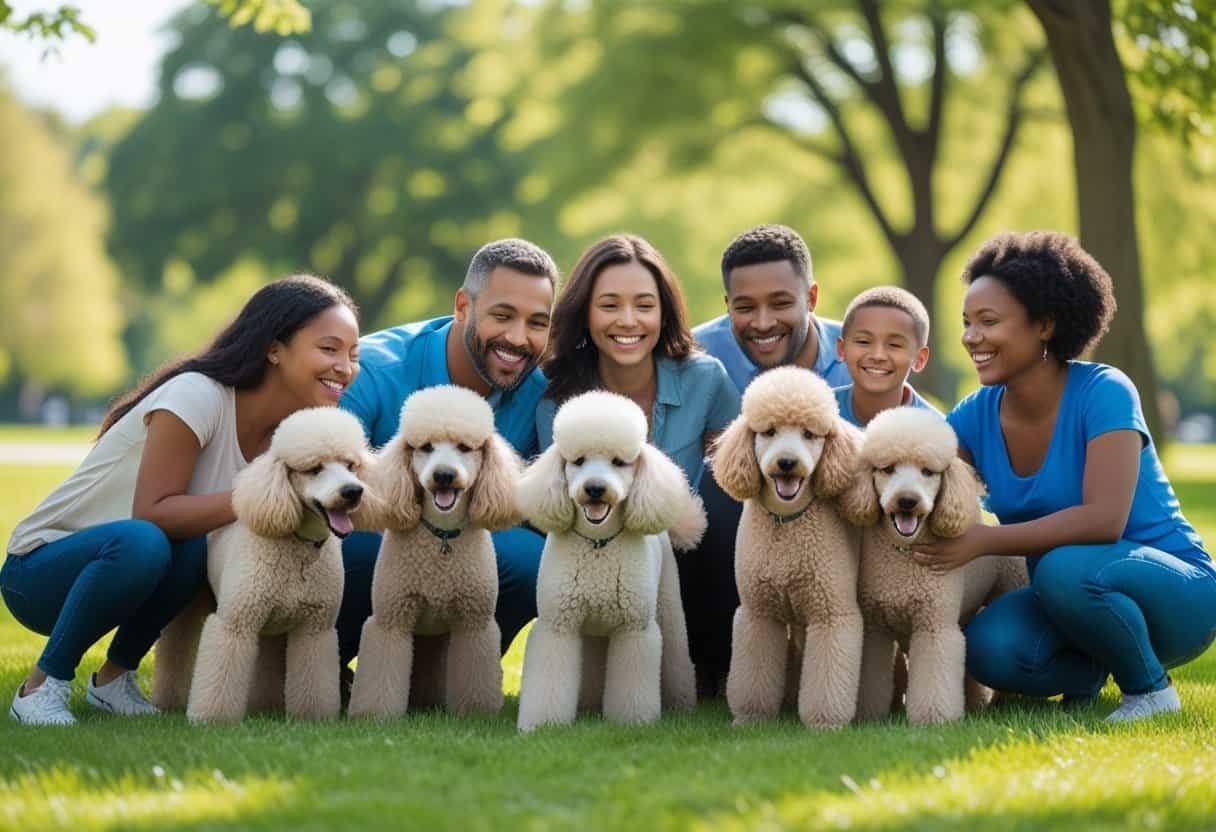
Adopting a rescue poodle brings real advantages to both the dog and the adopter. You’re giving a poodle a safe, loving home—and you might gain some health or training perks, too.
Plus, you’re helping animal non-profits keep doing their good work.
Giving a Loving Home
Lots of rescue poodles come from tough situations—neglect, getting lost, or being given up. When you adopt, you offer comfort and care that can change a dog’s life.
A loving home lets rescue dogs bounce back. Routines, warmth, and affection matter a ton for these sensitive, smart animals.
Rescue organizations often say adopted poodles bond deeply with their new people. They’re grateful, in their own way.
Positive impacts on poodles:
- Less stress and anxiety
- Better behavior
- Improved health
- Trust in people grows
Giving a rescue poodle a home is a second chance, plain and simple. Many families say adoption feels incredibly rewarding, especially knowing they’re making a difference. More on re-homing poodles in need.
Health and Temperament Advantages
Rescue poodles sometimes bring unexpected health and temperament benefits. Most rescue groups make sure their dogs get vet checks, vaccines, and are spayed or neutered before adoption.
Some poodles come with basic training or social skills, especially if they’ve lived in homes before. That can make things easier for everyone.
Poodles are smart, adaptable, and usually eager to please. They adjust quickly to new places.
Rescue groups look out for health or behavior issues and try to match dogs with the right families. You can find more adoption and care tips from rescue experts.
Supporting Non-Profits
When you adopt, you support non-profits focused on saving and re-homing dogs. These groups rely on adoption fees and donations to keep going.
By adopting, you help more animals get care, medical attention, food, and a safe place to stay. Groups like Poodle & Pooch Rescue have been at it since the 1950s, finding homes for thousands of poodles. Here’s a bit more on the history of poodle rescue.
Every adoption frees up space and resources for another dog waiting for a home. This cycle really depends on people choosing to adopt, not shop.
Types of Rescue Poodles
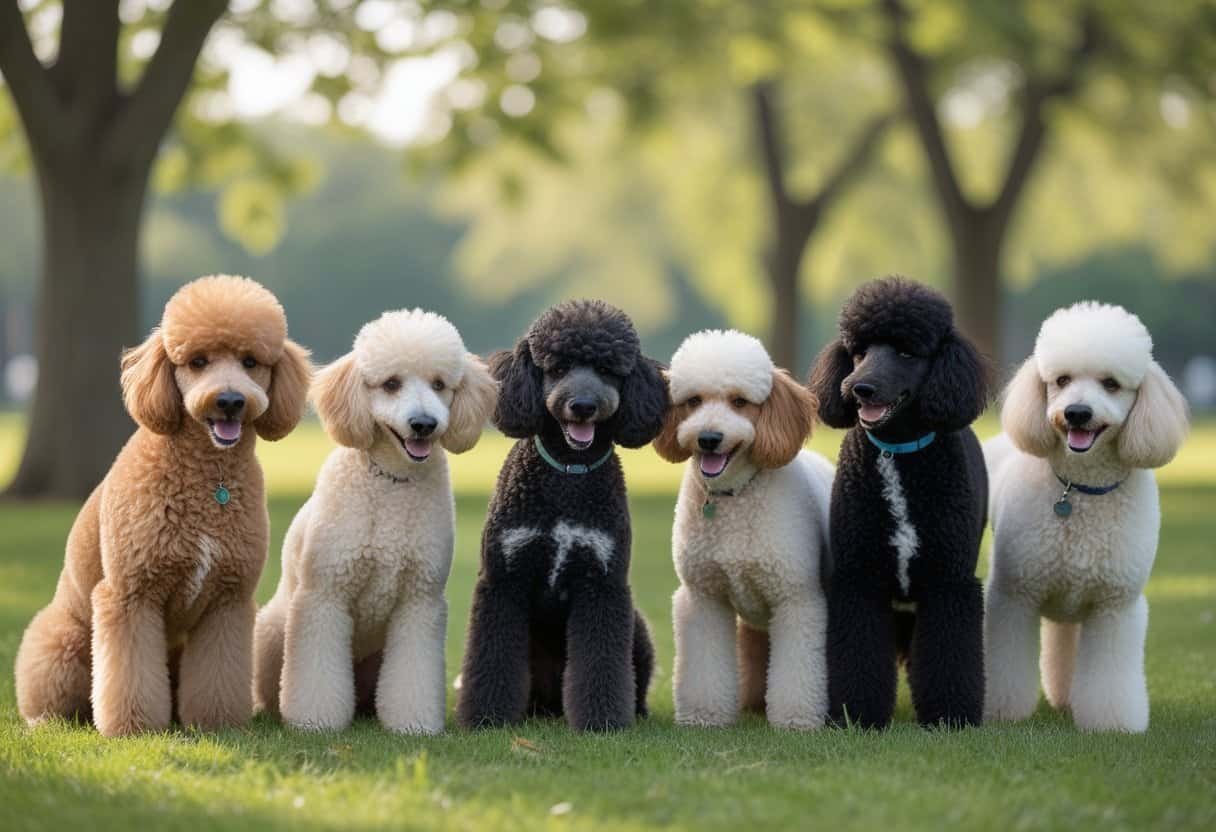
Poodles in rescue come in all sizes and mixes. Each type has unique traits, care needs, and personalities.
Standard Poodles
Standard Poodles are the biggest, usually weighing 40-70 pounds and standing over 15 inches tall. They’re smart and loyal, with a reputation for being a bit calmer than their smaller cousins.
Because of their size, standard poodles need plenty of exercise—walks, playtime, or a fenced yard. They’re easy to train and usually do well with kids and other pets.
Their curly coats need regular grooming to avoid mats. It’s a commitment, but worth it.
Many standards end up in rescue when families can’t give them enough activity or space. They thrive with attention, mental challenges, and a steady routine.
Standard poodles are often considered hypoallergenic because they shed very little, which is great for allergy sufferers. If you want to know more about adopting standard poodles, check out that link.
Miniature Poodles
Miniature Poodles are smaller—10-15 pounds and up to 15 inches tall. They’re energetic and alert, and they get really attached to their people.
Minis work well in apartments or small homes, but they still need play and mental stimulation. They love being with people, though some can be shy with strangers.
Sometimes, miniature poodles bark or get anxious, so a bit of training goes a long way. In rescue, they’re often given up because of lifestyle changes or lack of time.
Their coats need regular grooming, just like the bigger poodles. If you’re looking for groups that focus on miniature poodle rescues, you can find plenty of options.
Poodle Mixes
Poodle mixes—“doodles”—cover everything from Labradoodles to Cockapoos. They get the poodle’s brains and curls, but also traits from the other breed.
Sizes, energy, and grooming needs vary a lot depending on the mix. Some mixes shed less, but not all are hypoallergenic.
Poodle mixes sometimes act in unpredictable ways because of their mixed background. They’re super popular in rescues, but not everyone understands what they’re getting.
If you’re interested in a specific mix, do your homework. There’s a list of poodle mixes up for adoption if you want to browse.
Adoption Process for Rescue Poodles
Adopting a rescue poodle isn’t instant. There are a few steps, some requirements, and usually a bit of waiting.
The process helps make sure the dog and family are a good match. Rescues want to see that adopters are ready for a lifelong commitment.
Application Steps
Most rescues start with an online application. You’ll fill in your name, address, work schedule, and pet experience.
Some groups ask about your living situation and current pets, too. They want to know why you want a poodle and what kind of care you’ll provide.
Questions might cover how much time you’ll spend with the dog, your exercise plans, and who’ll care for the dog when you’re out. It’s not meant to be intimidating—it’s just about finding the right fit.
Some rescues want references or a note from your vet. Including those early can speed things up.
Make sure you answer every question, or you might hit delays. For step-by-step help, here’s a guide to adoption.
Screening and Requirements
After you apply, most rescues set up a screening. There might be a phone interview to talk about your routine, pet care, and what you expect from adoption.
They may ask about your training style or how you’d handle common breed quirks. Sometimes, they’ll want to talk about any challenges you’ve had with pets in the past.
A home check is common, too. Someone might visit to see where the poodle will live and check for safety.
They’ll look at fencing, escape risks, and the general setup. It’s not about being perfect—just safe and welcoming.
Rescues usually require that all dogs are spayed or neutered, up to date on vet care, and that you agree to return the poodle if things don’t work out. For more details, check out these adoption policies and contract details.
What to Expect After Approval
After you get approved, you might have to wait for a match with the right poodle. Some rescues keep waiting lists, so finding the right dog for your lifestyle could take weeks or even months.
When a match happens, most rescues set up a meet-and-greet. This first meeting gives you and the poodle a chance to interact in a calm, safe spot.
If everyone feels good about it, you pay the adoption fee and sign a contract with the rescue. That contract covers the rescue’s terms—nothing too surprising, but it’s worth reading.
The rescue hands over medical records and shares what they know about the poodle’s background, care needs, and quirks. They’ll usually encourage you to reach out with questions or updates as your new dog settles in.
Full medical care, including spay or neuter surgery, is usually done before adoption.
Preparing Your Home for a Rescue Poodle
A rescue poodle needs a safe, welcoming space to start off right. The right setup makes house training and settling in a lot less stressful.
Initial Home Setup
Give your new poodle security and comfort from day one. Start by clearing away hazards—think toxic plants, loose cords, trash cans, or anything small enough to swallow.
Use gates or barriers to block off rooms and stairs if you need to. It’s much easier to supervise a new dog in a smaller area.
Set up a quiet spot with a soft bed, water, and a few toys. This will be their retreat, a place to relax and feel safe.
A crate can really help, too—it’s a safe base and makes house training smoother.
Check your yard for holes, weak spots in the fence, or escape routes. Lock up chemicals and gardening tools. Poodles can be sneaky jumpers or climbers, so sturdy fencing is a must.
If you want more tips, check out this guide on creating a safe environment for a rescue poodle.
House Training Tips
House training takes time and a fair bit of patience. Pick a potty spot outside and take the dog there often, especially after eating or naps.
Consistency matters—a lot. Use positive reinforcement like treats and praise when your poodle gets it right.
If there’s an accident, clean the spot well to get rid of any lingering scent. Don’t punish—it just slows things down.
Feed and walk your dog on a predictable schedule. That way, you can guess when nature will call.
Watch for signs like sniffing or circling. Get the dog outside fast if you spot those.
Patience and consistency are your best friends here. For more detailed tips, take a look at house training rescue poodles.
Fostering Rescue Poodles
Fostering gives poodles a safe place to land until they find a forever home. It’s about providing shelter, care, and a little patience so the dogs can adjust and get ready for adoption.
Becoming a Foster Home
Anyone can apply to foster, but you’ll need a stable, pet-friendly home. Foster families offer a temporary haven for dogs that might’ve been abandoned or mistreated.
The main job? Give them love, basic training, and daily care. Foster parents handle feeding, grooming, and helping the poodle get used to new routines.
Sometimes you’ll work with shy or nervous dogs, introducing them slowly to household life. Home visits or virtual checks are common before you get approved.
Most rescues, like Coastal Poodle Rescue, support foster homes and cover medical expenses. That can include vet visits, vaccinations, and sometimes food or grooming supplies.
Foster Program Requirements
Foster programs have clear rules to keep animals safe and healthy. You’ll need to provide a clean space, regular meals, water, exercise, and supervision.
Most rescues want all your resident pets vaccinated. Some require a fenced yard, and you shouldn’t leave the poodle outside alone.
It’s important to follow the rescue group’s instructions and keep them updated on the dog’s progress.
Programs like Standard Poodles In Need make sure all poodles are vetted, vaccinated, and microchipped before adoption. The rescue stays involved and helps with emergencies or questions.
Transitioning to Permanent Homes
Foster homes help poodles get ready for adoption—teaching house manners, basic obedience, and how to be around other pets or kids.
Foster parents share feedback about the poodle’s personality and needs. The rescue group usually handles matching and the adoption process.
Foster families might meet potential adopters, answer questions, or help out during visits. The goal is always a smooth, stress-free transition.
Once a match is made, the rescue goes ahead with re-homing. Fosters often provide updates and sometimes support the new family as the poodle settles in.
Health and Veterinary Care
Rescue poodles sometimes show up with health issues. They might need vaccinations, treatment for existing conditions, or just a good checkup.
Common Medical Issues
Poodles tend to have a few health problems more than other breeds. Skin allergies, ear infections, and dental disease are common.
Older poodles might deal with joint pain or arthritis. Some struggle with eye problems like cataracts or progressive retinal atrophy.
Hip dysplasia can also pop up, making it tough for them to walk. Watch for signs like limping or changes in how they act—here’s what to look for.
Not every health problem shows up right away, so regular check-ups are a must.
Here’s a quick look at some common issues:
| Health Issue | Symptoms | Treatment |
|---|---|---|
| Skin allergies | Itching, redness, rashes | Special shampoos, diet |
| Ear infections | Head shaking, odor, redness | Cleaning, medication |
| Dental disease | Bad breath, tooth loss | Dental cleanings, diets |
Importance of Veterinary Care
Rescue poodles really need solid veterinary care. Dogs coming from tough situations might have missed out on basic vet visits, vaccines, or dental checks.
Rescue groups work hard to make sure every poodle gets a full exam and any treatments they need. This includes vaccines, spaying or neutering, and tests for things like heartworm.
If a poodle’s been neglected or abused, they might need extra care. Vets can spot hidden problems and help dogs heal physically and emotionally.
Groups offering poodles for adoption make sure veterinary care is handled before the dogs go to new homes.
Ongoing Health Maintenance
Caring for a rescue poodle doesn’t stop after adoption. Regular checkups, annual vaccines, and parasite prevention keep them healthy.
Keep up with dental cleaning, flea and tick control, and heartworm meds. Feeding a balanced diet with the right nutrients helps, too—nutrition counseling can make a difference.
Watch for changes in weight, coat, or mood. Spotting problems early means quicker, less expensive fixes.
Many rescues offer nutrition counseling and preventative care so each poodle has the best shot at a healthy life.
Working With Poodle Rescue Organizations
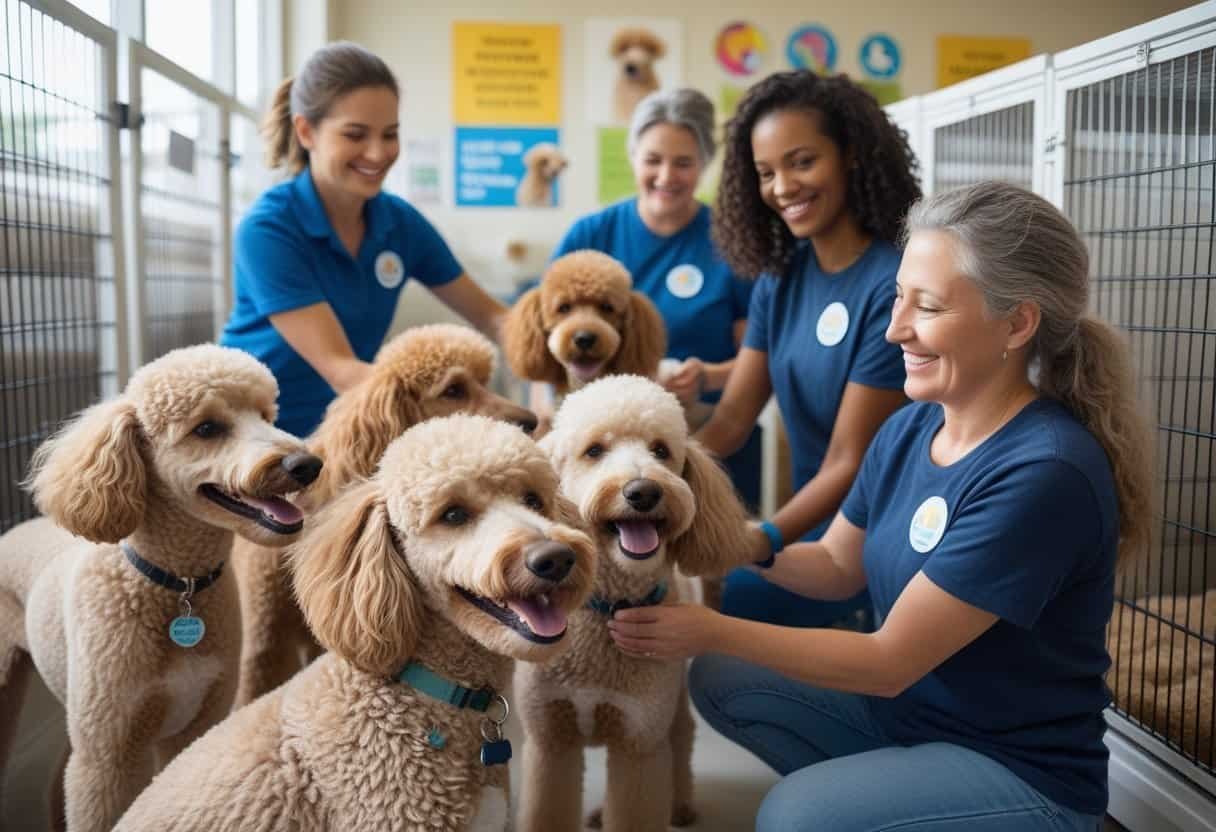
Rescuing poodles takes teamwork. Non-profits, poodle clubs, and networks of supporters all pitch in to care for and place these dogs.
Role of Non-Profit Groups
Non-profit organizations drive most poodle rescue work. They rely on donations and volunteers to save, rehab, and rehome poodles.
These groups handle vet exams, vaccines, spaying or neutering, and foster care. Staff and volunteers check each dog’s temperament and health to make sure they’re a good fit for new families.
Non-profits manage the adoption process, including interviews and home visits. Their main goal? Making sure every poodle lands in a safe and loving home.
A lot of these organizations also educate adopters about life with a poodle. The Poodle Club of America Rescue Foundation is a big name, offering national support to local rescues.
Poodle Club Partnerships
Poodle clubs, especially the Poodle Club of America, work closely with rescue groups. These partnerships bring more resources, experience, and support for finding homes.
Clubs keep lists of reputable rescues and push for ethical treatment. They set standards for how rescued dogs are evaluated and placed.
Clubs also organize adoption events and fundraisers. Members foster dogs, drive them to appointments, or even open their homes temporarily.
By connecting local and national rescue groups, clubs share tips and best practices. All this increases the odds that rescued poodles end up in good homes.
Networking and Advocacy
Networking helps rescue groups reach more people. Volunteers and supporters use social media, email, and adoption sites to spread the word about poodles needing homes.
Sites like Petfinder and Rescue Me! list thousands of adoptable dogs, including poodles across the country.
Advocacy focuses on responsible pet ownership and spaying or neutering to prevent more homeless dogs. Rescue groups team up with vets and trainers to help poodles adjust and avoid returns.
Many organizations run awareness campaigns and community events. By networking and speaking up, rescue groups pull together animal lovers and help more poodles find families.
Supporting Rescue Poodles
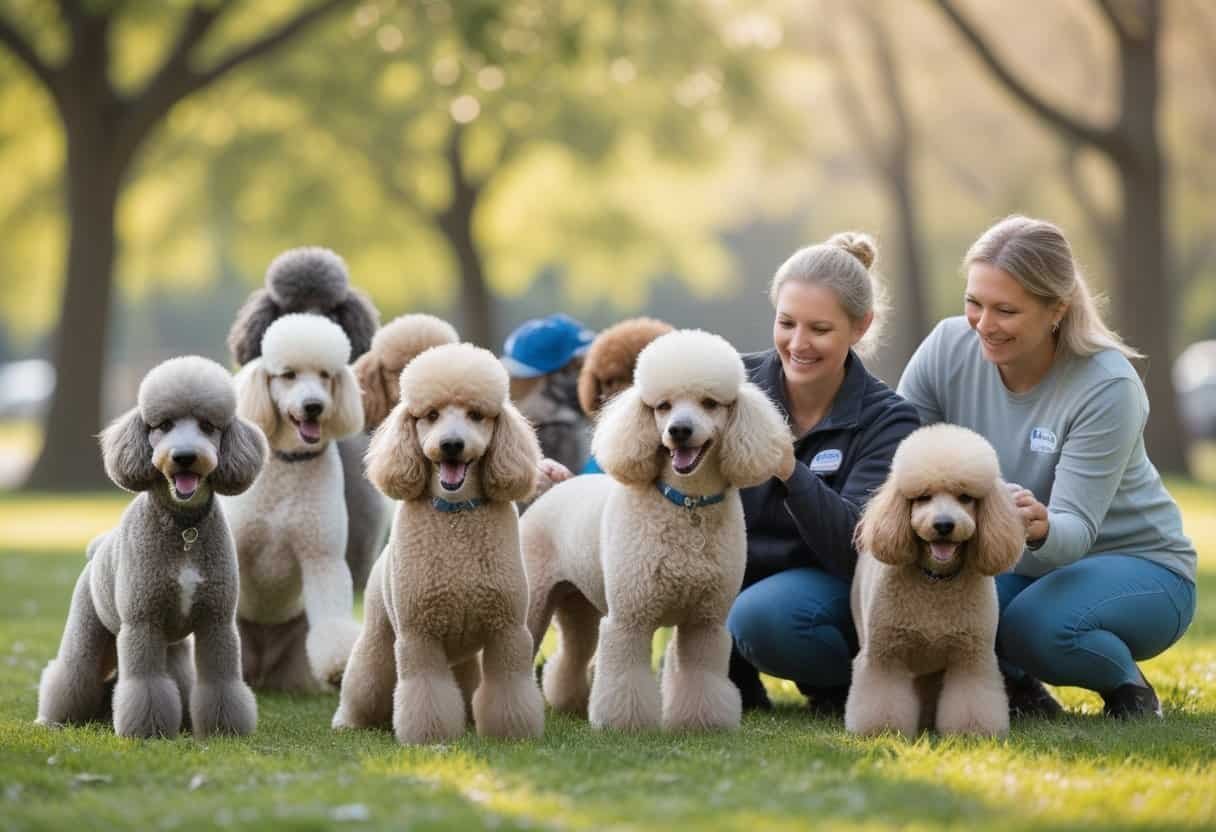
Rescue poodles count on people who care. There are plenty of practical ways to help, whether you have a lot of time, a little money, or just some extra dog toys.
How to Donate
Donations keep rescue groups running—paying for food, vet care, and safe shelter. Giving to a poodle rescue non-profit is a quick, direct way to support their work.
Most organizations take one-time or monthly online donations. Some also need supplies like food, beds, toys, and grooming tools.
Check the rescue’s website for wish lists. If you want to do more, ask about sponsoring a specific dog or covering a special surgery.
Gifts to registered non-profits might be tax-deductible, but it’s smart to double-check credentials. Most groups post this info on their official sites.
Volunteering Opportunities
Volunteers really keep most poodle rescue organizations running. People help by fostering dogs until they find homes, assisting at events, or handling transport.
Foster families give daily care, socialization, and a safe place for poodles in transition. Others pitch in by walking dogs, snapping photos for adoption listings, or updating social media pages.
Sometimes, groups need help with grant writing, answering emails, or running fundraising campaigns. Many rescue groups post current volunteer roles on their websites.
Some roles—especially those involving direct animal care—require a quick application or background check. Even a few hours a week can make a real difference for these non-profits and their poodles.
Poodle Adoption Success Stories
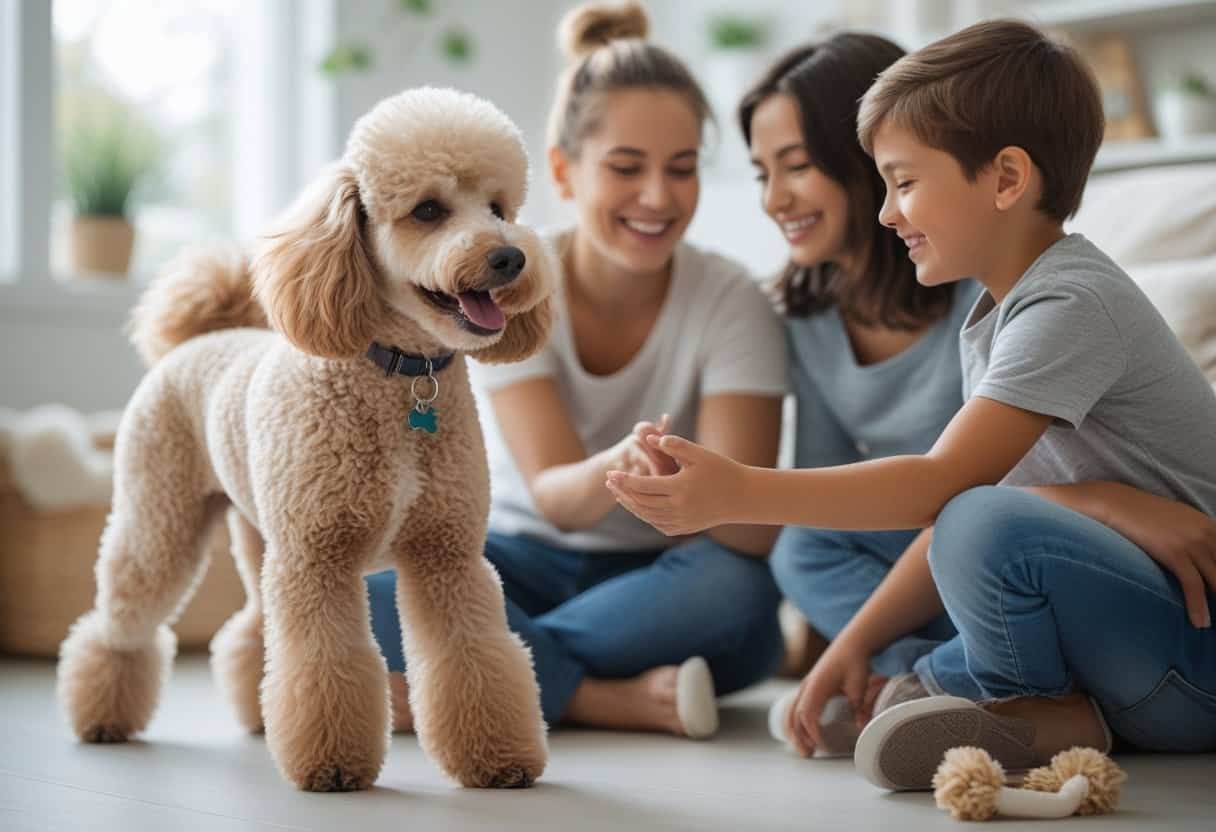
Adopting a poodle doesn’t just change the dog’s life—it often brings new energy and companionship into a home. Some rescue poodles bounce back in amazing ways, both physically and emotionally, once they land in a caring environment.
Transformations After Rescue
Many poodles show up at shelters in rough shape or with signs of neglect. Rescue groups and new families help these dogs recover, sometimes pretty quickly.
Physical changes usually come first: dull coats turn shiny, underweight pups fill out with regular meals, and grooming plus vet visits do wonders. Emotional progress matters just as much.
Rescue poodles often start off shy, scared, or withdrawn. Over time, with patience and attention, they start to trust people again.
Families who adopt a poodle often talk about how their new pets become friendly, happy, and playful after settling in. These stories really show the lasting impact of patience, daily care, and a feeling of safety.
Here’s a quick list of common changes seen in rescued poodles:
- Better appetite and weight gain
- More playful and energetic behavior
- Improved coat and skin health
- Reduced anxiety and fear
Notable Rescue Poodles: Charlie
Charlie was a miniature poodle who spent months in a shelter after someone found him abandoned. He arrived scared, matted, and painfully thin.
Volunteers worked with him every day, offering gentle care and short walks. They gave him regular meals and celebrated even his smallest successes.
When Charlie’s new family adopted him, they kept up his routines. Within a month, he wagged his tail and greeted visitors at the door.
He bonded with the family’s other dog and soon became a regular at the local park. Stories like Charlie’s? They show how quickly things can turn around when someone decides to adopt a poodle.
Charlie’s journey inspired others to consider adoption, which led to more dogs finding homes. Each step forward mattered and, honestly, it’s hard not to feel moved by what rescue and adoption can do for both poodles and their people.
Poodle Clubs and Associations
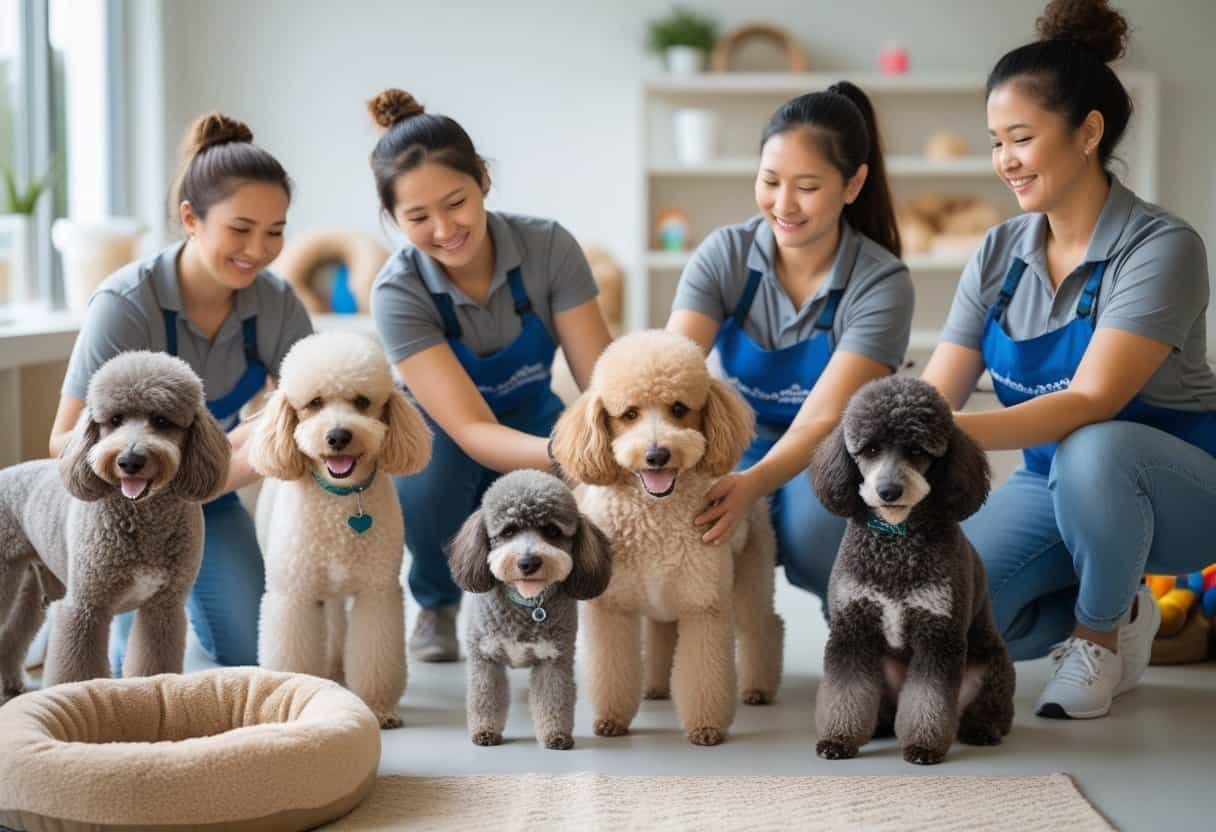
Breed clubs and associations work to protect poodles’ future and support responsible dog ownership. They take on everything from rescue to maintaining breed quality and health.
Poodle Club of America
The Poodle Club of America (PCA) is a national group focused on purebred poodles. They support breed standards and help poodles in need through rescue organizations and volunteer groups.
The PCA teams up with local clubs and chapters across the U.S. They run programs that teach owners about grooming, training, and health care.
They also host events and competitions where poodle owners can show off their dogs’ skills—obedience, agility, conformation, you name it. For folks interested in rescue, the PCA works with groups like the Poodle Club of America Rescue Foundation and shares info on adoption and volunteering.
Membership is open to poodle owners, breeders, and enthusiasts. The club encourages responsible breeding and helps people connect with reputable breeders and local rescue organizations.
AKC and Breed Standards
The American Kennel Club (AKC) sets the official breed standards for poodles in the U.S. These standards cover size, coat type, color, and temperament for all three poodle sizes: Toy, Miniature, and Standard.
These guidelines help judges, breeders, and owners recognize what makes a poodle a good example of the breed. Poodles that meet AKC standards can enter AKC dog shows and events.
The AKC recognizes the Poodle Club of America as the parent club for the breed. This partnership helps keep the breed healthy, supports rescue work, and encourages responsible ownership.
Anyone looking to adopt or rescue a poodle can use the guidelines from the AKC and parent clubs to get a sense of what to expect in terms of care, behavior, and health. For more on breed standards and how they relate to rescue poodles, check out the Poodle Club of America’s rescue section.
Frequently Asked Questions

Rescue poodles often have unique backgrounds that shape their care and adoption process. Knowing how rescues work, what these dogs need, and what owners should expect can help families make better choices.
What is the process for adopting a rescue Poodle?
Adopting a rescue poodle starts with filling out an application and sharing details about your living situation. Most rescues require interviews, reference checks, and sometimes a home visit.
Once approved, the group matches adopters with a poodle that fits their family. Some organizations offer support before and after adoption. You can read more about the process in this step-by-step guide.
How can I find a reputable Poodle rescue organization in my area?
Look for rescues that are well-established and have good reviews. Many reputable rescues offer ongoing support and have a clear adoption process.
You can check breed-specific rescue lists, ask local vets, or browse rescue directories like We Love Doodles’ list for New South Wales.
What should I consider before adopting a Poodle from a rescue?
Think about whether you can meet the poodle’s physical, emotional, and medical needs. Rescue poodles may have special requirements, especially if they’ve been through trauma or neglect.
Be ready for an adjustment period as your new dog settles in. It’s not always easy, but it’s worth it.
What is the typical health and temperament of a rescue Poodle?
Most rescue poodles see a veterinarian and get needed medical care before adoption. Some rescues have dogs with medical or behavioral challenges, but plenty are healthy and sociable.
The temperament of a rescue poodle can vary depending on their background. Organizations do their best to make sure each dog is ready for a new home.
How do rescue organizations assess compatibility between Poodles and potential owners?
Rescue groups use interviews and questionnaires to learn about an adopter’s lifestyle, experience, and expectations. They look at the dog’s temperament, age, and care needs when recommending matches.
Adopters might meet several dogs to see which one feels right. There’s a bit of trial and error, but that’s just part of the journey.
Are there specific requirements for taking care of a rescued Poodle?
Rescued Poodles usually need a bit more patience than you might expect. Consistent routines can help them feel safe.
Gentle training works best. Some of these pups might need to see the vet more often or eat special food.
Many rescues actually share tips and resources, so you won’t have to figure it all out alone.




